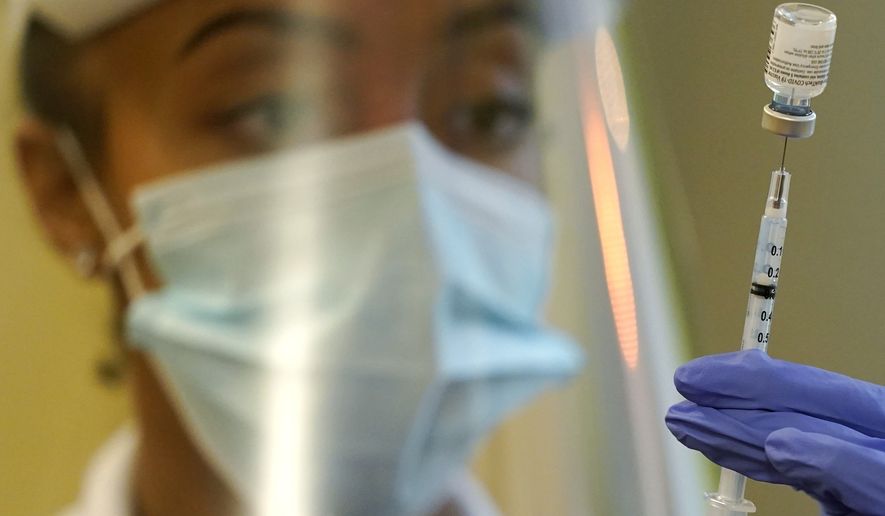A vaccine advisory panel to the Centers for Disease Control and Prevention on Thursday approved COVID-19 boosters for more Americans, opening access to these extra doses for millions.
The CDC’s Advisory Committee on Immunization Practices greenlighted third doses for people 65 years and older, long-term care facility residents and those 18 and older with underlying conditions. However, the panel declined to recommend boosters for those younger than 65 who are working or living in a setting where COVID-19 spread could be greater — straying from the Food and Drug Administration’s earlier decision to authorize the extra doses for this group.
“The science shows we have a really effective vaccine, and we aren’t making this decision for the unvaccinated. We’re making this decision for the vaccinated. And I don’t think we have the data for these younger age groups to make a decision for a booster dose,” said Lynn Bahta, ACIP member and vaccine expert at the Minnesota Department of Health. “To me that would suggest the vaccine doesn’t work, and we know that isn’t true, but that’s how that message will be conveyed to the broader public.”
The decision trails the FDA’s approval late Wednesday of booster shots of the Pfizer-BioNTech mRNA vaccine for emergency use for seniors, those with underlying conditions and individuals whose jobs put them at higher risk of infection.
The revised emergency use authorization by the FDA allows booster doses for health care workers, teachers, day care staff, grocery workers and individuals in homeless shelters and prisons. Regulators said the boosters can be administered at least six months after the second dose was given in the initial vaccination course.
It’s up to the CDC to finalize U.S. policy on who is eligible for the extra shots.
While members of the CDC’s advisory panel unanimously agreed on giving boosters to seniors, they were split on offering the extra doses to younger age groups.
Findings from multiple studies show that vaccine protection against COVID-19 declines over time, especially in older people, CDC’s Dr. Sara Oliver said during Thursday’s meeting. However, data shows that the COVID-19 vaccines still provide strong protection for all age groups.
The CDC advisers also shared their concern about Americans who received Moderna or Johnson & Johnson shots earlier in the pandemic. Those vaccines have not been considered for boosters, and data about mixing vaccines is unavailable.
Although boosters could help ease the pandemic, advisers said getting more people vaccinated should be the prime focus.
“We may move the needle a little bit by giving a booster dose to people, not just because of age or risk,” said Dr. Helen Keipp Talbot, ACIP member and infectious disease specialist at Vanderbilt University. “But the real fact of the matter is this is a pandemic of the unvaccinated. The hospitals are full because people aren’t vaccinated. We’re declining care to people who deserve care because we are full of unvaccinated, Covid-positive patients.
“We could give boosters to people, but that’s not really the answer to this pandemic,” she said.
The FDA followed the recommendation of a panel of outside advisers, who days earlier rejected President Biden’s push to give boosters to the general population amid reports of breakthrough infections in the fully vaccinated and data that show waning immune responses after six months or so.
Advisers said there wasn’t enough evidence on whether the general population needs booster shots, citing a lack of safety data.
Early safety monitoring shows more than 2,500 adverse reactions after a third dose of mRNA vaccines have been reported, but 95% of those were non-serious incidents for both Pfizer and Moderna vaccines, said Dr. Anne Hause of the CDC, referring to data from the Vaccine Adverse Event Reporting System (VAERS). Eighteen deaths were reported after the third dose with the top preliminary cause being respiratory or cardiac arrest. Pain and fatigue were the most commonly reported after effects of the mRNA vaccines.
Third doses of the Pfizer and Moderna vaccines are already approved for certain people with weakened immune systems such as organ transplant recipients and cancer patients.
Ahead of approving booster doses for more people, the FDA had studied data on the safety and immune responses from a group of participants from the original clinical trial of Pfizer-BioNTech’s COVID-19 vaccine.
Data showed that the immune responses of about 200 participants 18 to 55 years old who received a booster dose about six months after their second shot had a similar antibody response against the coronavirus one month after a booster shot as they did a month after their completing their two-dose vaccine round.
Dr. William Gruber, Pfizer’s senior vice president of vaccine clinical research and development, last week told FDA advisers that there is a “clear erosion” of protection and that high levels of vaccine effectiveness must be maintained. Efficacy dropped from 96% two months after vaccination to about 84% up to six months later, he noted, adding that he anticipates that an extra vaccine dose would boost protection and reduce the spread of COVID-19.
Vaccine effectiveness wanes over time regardless of variants, he said. With the delta variant, Dr. Gruber said surveillance data shows waning protection between five and 10 months after the second shot of the Pfizer vaccine. He said a third dose provided a “substantial boost” against the delta variant, similar to the original coronavirus strain, and had comparable reactions to the vaccine’s second dose.
• This article is based in part on wire service reports.
• Tom Howell Jr. can be reached at thowell@washingtontimes.com.
• Shen Wu Tan can be reached at stan@washingtontimes.com.




Please read our comment policy before commenting.